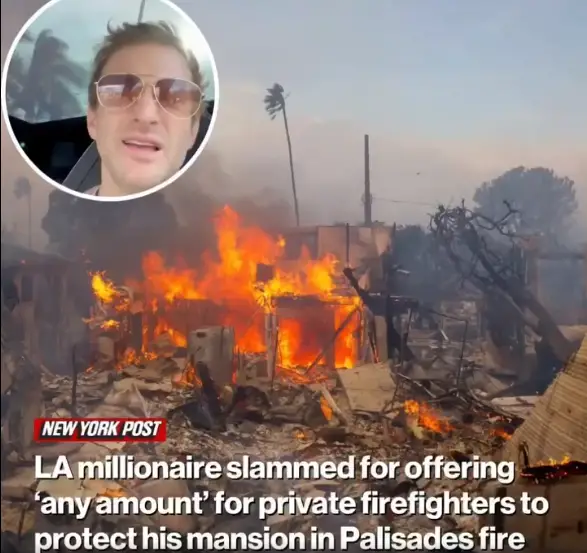As Los Angeles battles yet another devastating wildfire season, a wealthy CEO’s tone-deaf response to the crisis has ignited a wave of public outrage. While firefighters risk their lives to protect homes and save lives, the audacious remarks from a millionaire property owner have left many questioning the divide between privilege and accountability during disasters.
The Controversial Plea
The Los Angeles fires have brought devastation to communities, destroying homes and forcing thousands to evacuate. In the midst of this chaos, a well-known millionaire CEO, who has not been publicly named in some reports, made headlines after offering to “pay anything” to save his sprawling estate in Malibu. According to sources, the CEO directly contacted private firefighting firms, urging them to prioritize his property over others.
His plea was made public through social media, where he allegedly stated: “I will pay anything. Just save my home.”
A City in Crisis
Los Angeles has been no stranger to wildfires, but this season’s blazes have reached unprecedented levels of destruction. Tens of thousands of acres have been reduced to ash, and thick smoke blankets the city, leaving many residents struggling with respiratory issues. Emergency services have been working around the clock to manage the crisis, yet resources remain stretched thin.
Amid this backdrop of shared hardship, the CEO’s plea has struck a nerve. Many residents have taken to social media to express their frustration, accusing him of selfishness and a lack of solidarity with those less fortunate.
Public Outrage
The public reaction to the CEO’s comments has been overwhelmingly negative. Critics argue that his offer to “pay anything” not only displays a disregard for those who cannot afford private firefighting services but also highlights the growing disparity between the wealthy and the average citizen during times of crisis.
Local resident Maria Hernandez shared her thoughts on the matter: “My family lost everything, and we barely got out alive. Meanwhile, someone is throwing money around to protect their mansion? It’s insulting.”
Similarly, social activist Jamie Collins stated: “Wildfires don’t discriminate. Why should the protection against them be a privilege for the rich?”
The Role of Private Firefighters
While public firefighting services are the primary defense against wildfires, wealthy homeowners in California have increasingly turned to private firefighting companies to protect their properties. These services, often contracted through high-end insurance providers, deploy specialized crews to safeguard individual homes.
Private firefighting has long been a controversial topic, with critics arguing that it creates a two-tiered system where the wealthy receive preferential treatment during disasters. Environmental advocate Sarah Levine commented: “Private firefighting reflects a system where money talks, and it’s a dangerous precedent. Resources should be allocated based on need, not wealth.”
The Bigger Picture: Inequality in Disaster Response
The CEO’s remarks have reignited debates about inequality in disaster preparedness and response. While wealthy individuals can afford measures like private firefighting teams, fortified homes, and advanced warning systems, lower-income families often struggle to evacuate and rebuild after disasters.
This disparity is evident in the aftermath of the Los Angeles fires. Families in working-class neighborhoods face prolonged recovery times due to insufficient insurance coverage and limited financial resources. Meanwhile, affluent areas with private protections often emerge relatively unscathed.
Dr. Eric Williams, a sociologist studying disaster inequality, explained: “Disasters like wildfires don’t just destroy homes—they expose and exacerbate the deep divides in our society. The wealthy have the means to insulate themselves, while others are left to bear the full brunt of these tragedies.”
Efforts to Address the Crisis
Los Angeles city officials and emergency services have reiterated their commitment to providing equitable support during the wildfire crisis. Mayor Eric Garcetti emphasized the importance of community solidarity, stating, “In moments like these, we must come together as one city. Every life and every home matters.”
Nonprofits and grassroots organizations have also stepped up, offering assistance to displaced families and providing resources for those in need. However, the stark contrast between the experiences of wealthy homeowners and average residents remains a point of contention.
Moving Forward
The backlash against the CEO’s comments underscores a growing frustration with the inequities that surface during disasters. Many are calling for systemic changes to ensure that emergency resources are distributed fairly and that vulnerable communities receive adequate support.
Climate experts warn that as wildfires become more frequent and severe due to climate change, these disparities will only widen unless proactive measures are taken. From improved land management policies to accessible insurance options, the solutions must address both the causes and consequences of wildfires.

